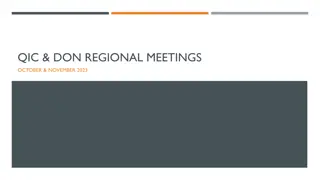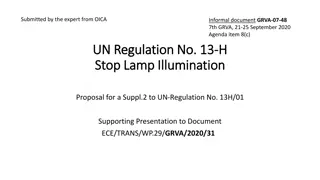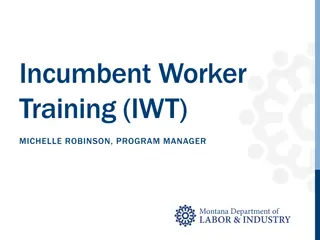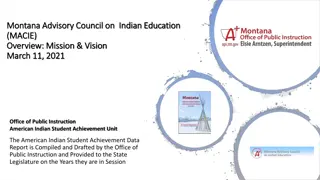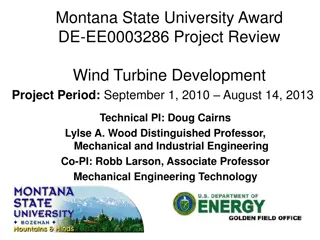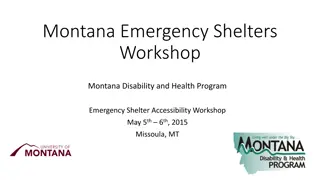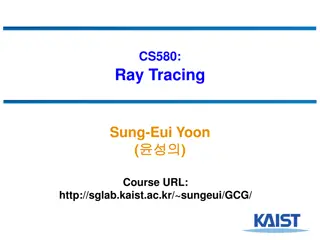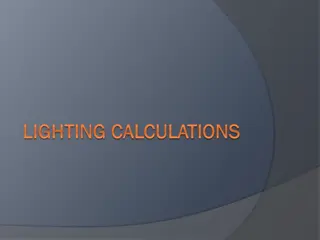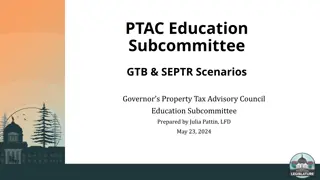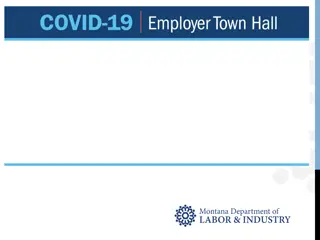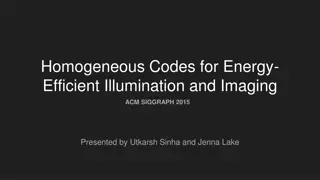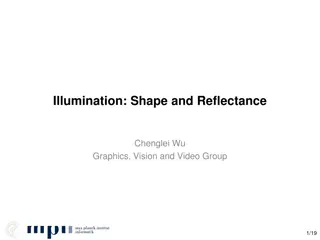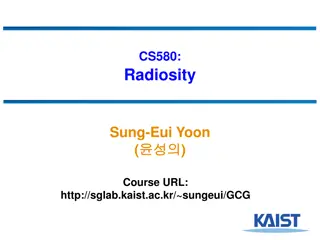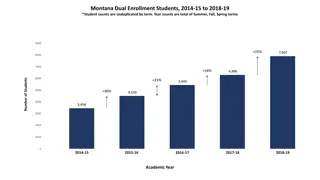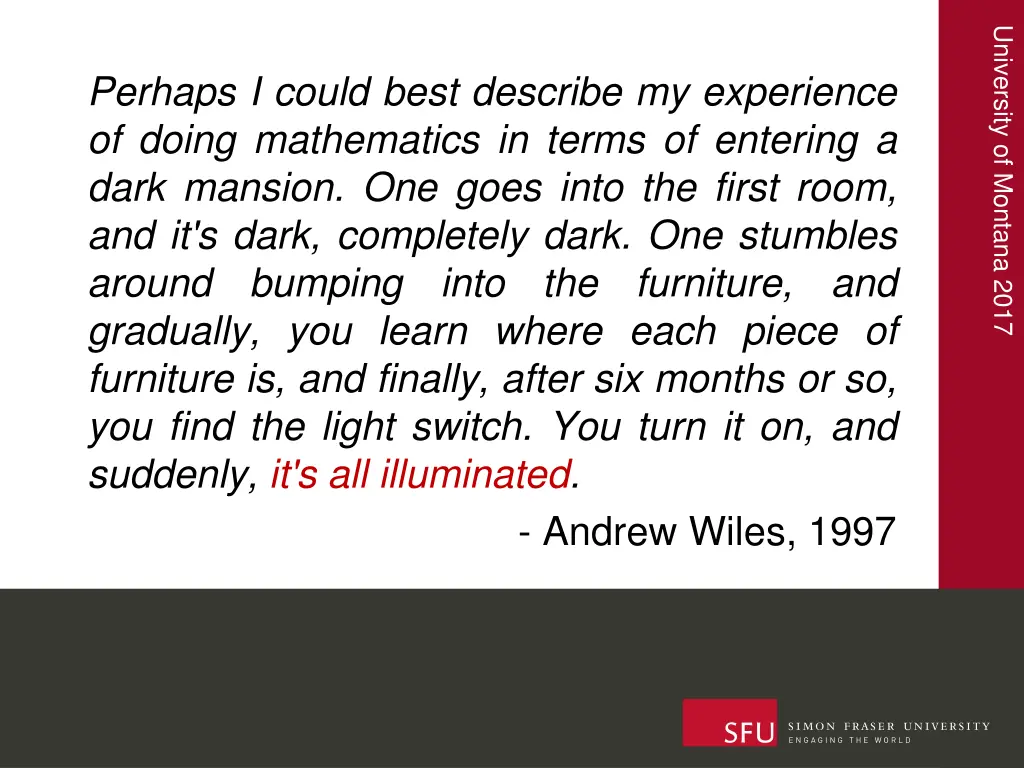
Mathematics Illumination: A Journey of Discovery and Creativity
Embark on a mathematical journey akin to entering a dark mansion where gradual discovery leads to illumination. Explore the nature of illumination in mathematics through the experiences of researchers like Peter Liljedahl. Delve into the creative process, from initiation to verification, and the profound impact of the "AHA!" moment on mathematical discovery. Uncover the origins of ideas in mathematics through the works of renowned mathematicians like Henri Poincaré and Jacques Hadamard.
Download Presentation

Please find below an Image/Link to download the presentation.
The content on the website is provided AS IS for your information and personal use only. It may not be sold, licensed, or shared on other websites without obtaining consent from the author. If you encounter any issues during the download, it is possible that the publisher has removed the file from their server.
You are allowed to download the files provided on this website for personal or commercial use, subject to the condition that they are used lawfully. All files are the property of their respective owners.
The content on the website is provided AS IS for your information and personal use only. It may not be sold, licensed, or shared on other websites without obtaining consent from the author.
E N D
Presentation Transcript
University of Montana 2017 Perhaps I could best describe my experience of doing mathematics in terms of entering a dark mansion. One goes into the first room, and it's dark, completely dark. One stumbles around bumping into gradually, you learn where each piece of furniture is, and finally, after six months or so, you find the light switch. You turn it on, and suddenly, it's all illuminated. the furniture, and - Andrew Wiles, 1997
WHAT IS THE NATURE OF ILLUMINATION? Peter Liljedahl
University of Montana 2017 www.peterliljedahl.com/presentations liljedahl@sfu.ca @pgliljedahl
University of Montana 2017 Liljedahl, P. (2013). Illumination. ZDM: The International Journal on Mathematics Education, 45(2), 253-265.\ Liljedahl, P. (2005). Mathematical discovery and affect: The effect of AHA! experiences on undergraduate mathematics students. International Journal of Mathematical Education in Science and Technology, 36(2-3), 219-236. Borwein, P., Liljedahl, P., & Zhai, H. (2014). Mathematicians on Creativity. Washington, DC: Mathematical Association of America. Liljedahl, P. (2008). The AHA! Experience: Mathematical Contexts, Pedagogical Implications. Saarbr cken, Germany: VDM Verlag.
University of Montana 2017 DISCOVERY CREATIVITY AHA! EXPERIENCE INVENTION ILLUMINATION
University of Montana 2017 Henri Poincar Jacques Hadamard douard Clapar de Th odore Flournoy Origins
University of Montana 2017 1. initiation 2. incubation 3. illumination 4. verification Creative Process
University of Montana 2017 1. initiation 2. incubation 3. illumination 4. verification creative process Creative Process
University of Montana 2017 1. initiation 2. incubation 3. illumination 4. verification AHA! Experience creative process Creative Process
University of Montana 2017 1. initiation 2. incubation 3. illumination 4. verification AHA! Experience creative process Creative Process
University of Montana 2017 Given that the phenomenon of illumination is the defining characteristic of creativity, discovery, and invention, then what is the defining characteristic of illumination? That is, what sets illumination apart from other mathematical processes? Research Questions
University of Montana 2017 First, being a private phenomenon, it is directly accessible only to the experiencing subject. Second, being defined as an experience that happens suddenly and without warning, it cannot be captured just when the observer has time and means to observe. (Sfard, 2004) Researching Illumination
University of Montana 2017 First, being a private phenomenon, it is directly accessible only to the experiencing subject. Second, being defined as an experience that happens suddenly and without warning, it cannot be captured just when the observer has time and means to observe. (Sfard, 2004) ANNECDOTAL REFLECTION Researching Illumination
University of Montana 2017 I had been working on the problem for a long time without any progress. Then suddenly I knew the solution, I understood, everything made sense. It seemed like it just CLICKED! The above anecdote is a testament of what is referred to as an AHA! experience. Have you ever experienced one? The purpose of this assignment is to have you reflect upon such an AHA! experience and to explore exactly what you learned in that instance and what you think contributed to the moment. You will hand in: Study I - Undergraduates
University of Montana 2017 1. A detailed explanation of the specific mathematical topic that you were studying and the difficulty you were having with it (including any incorrect or incomplete understandings that you had of the topic before the AHA!). 2. The story of the AHA! experience as you remember it, paying particular close attention to what you were doing before it happened, when it happened, and how it made you feel when it happened. 3. A detailed explanation of your new understanding of the mathematical topic. 4. A conclusion as to how, upon reflection, the AHA! experience contributes to mathematical learning in general, and for you in particular. 5. Anything else that you feel would contribute to the reader gaining insight into the moment as you experienced it. Study I - Undergraduates
University of Montana 2017 undergraduate mathematics students (n=73) analytic induction cognitive (Poincar , 1952; Hadamard, 1945) analytic induction affective (McLeod, 1992) Liljedahl, P. (2005). Mathematical discovery and affect: The effect of AHA! experiences on undergraduate mathematics students. International Journal of Mathematical Education in Science and Technology, 36(2-3), 219-236. Study I - Undergraduates
University of Montana 2017 stuck idea idea idea idea AHA! idea Study I Cognitive
University of Montana 2017 stuck idea idea idea idea AHA! idea Study I Cognitive
University of Montana 2017 emotions - It felt great. self-efficacy - Knowing that I could stare at a problem and in time I would understand, gave me more confidence that I could be successful in math. motivation I felt inspired to do more if these types of problems. beliefs - I used to think that if you couldn't get it right away you didn't know how to do it. attitudes - Also, I enjoy math now. I feel like this success stimulated more success. Now I have raised my expectations in math. Study I Affective
University of Montana 2017 emotions - It felt great. self-efficacy - Knowing that I could stare at a problem and in time I would understand, gave me more confidence that I could be successful in math. motivation I felt inspired to do more if these types of problems. beliefs - I used to think that if you couldn't get it right away you didn't know how to do it. attitudes - Also, I enjoy math now. I feel like this success stimulated more success. Now I have raised my expectations in math. Study I Affective
University of Montana 2017 Illumination is (in part) an AFFECTIVEexperience. + The affective part is the REMARKABLE part. Study I Discussion
University of Montana 2017 1. At what time, as well as you can remember, and under what circumstances did you begin to be interested in mathematical sciences? Have you inherited your liking for mathematical sciences? Were any of your immediate ancestors or members of your family (brothers, sisters, uncles, cousins, etc.) particularly good at mathematics? Was their influence or example to any extent responsible for your propensity for mathematics? 2. Towards branch of mathematical science did you feel especially attracted? 3. Are you more interested in mathematical science per se or in its application to natural phenomena? 4. Have you a distinct recollection of your manner of working while you were pursuing your studies, when the goal was rather to assimilate the results of others than to indulge in personal research? Have you any interesting information to offer on that point? 5. After having completed the regular course of mathematical studies (which, for instance, corresponds to the program of the Licence mathematique or of two Licences or of the Aggregation) in what direction did you consider it expedient to continue your studies? Did you endeavor, in the first place, to obtain a general and extensive knowledge of several parts of science before writing or publishing anything of consequence? Did you, on the contrary, at first try to penetrate rather deeply into a special subject, studying almost exclusively what was strictly requisite for that purpose, and only afterwards extending your studies little by little? If you have used other methods, can you indicate them briefly? Which one do you prefer? 6. Among the truths which you have discovered, have you attempted to determine the genesis of those you consider the most valuable? 7. What, in your estimate, is the role played by chance or inspiration in mathematical discoveries? Is this role always as great as it appears to be? 8. Have you noticed that, occasionally, discoveries or solutions on a subject entirely foreign to the one you are dealing with occur to you and that these relate to previous unsuccessful research efforts of your? 9. Would you say that your principal discoveries have been the result of deliberate endeavor in a definite direction, or have they arisen, so to speak, in your mind? 10.Have you ever worked in your sleep or have you found in dreams the answers to problems? Or, when you waken in the morning, do solutions which you had vainly sought the night before, or even days before, or quite unexpected discoveries, present themselves ready-made to your mind? 11.When you have arrived at a conclusion about something you are investigating with a view to the publication of your findings, do you immediately write down the part of your work to which your discovery applies; or do you let your conclusions accumulate in the form of notes and begin the redaction of the work only when its contents are important enough? 12.Generally speaking, how much importance do you attach to reading for mathematical research? What advice in this respect would you give to a young mathematician who has had the usual classical education? 13.Before beginning a piece of research work, do you first attempt to assimilate what has already been written on that subject? 14.Or do you prefer to leave your mind free to work unbiased and do you only afterwards verify by reading about the subject so as to ascertain just what is your personal contribution to the conclusions reached? 15.As far as method is concerned, do you make any distinction between invention and redacting? 16.Does it seem to you that your habits of work are appreciably the same as they were before you had completed your studies? 17.When you take up a question, do you try to make as general study as possible of the more or less specific problems which occur to you? Do you usually prefer, first to study special cases or a more inclusive one, and then to generalize progressively? 18.In your principal research studies, have you followed the same line of thought steadily and uninterruptedly to the end, or have you laid it aside at times and subsequently taken it up again? 19.What is, in your opinion, the minimum number of hours during the day, week, or the year, which a mathematician who has other demands on his time should devote to mathematics so as to study profitably certain branches of these same mathematics? Do you believe that one should, if one can, study a little every day, say for one hour at least? 20.Do artistic and literary occupations, especially those of music and poetry, seem to you likely to hamper mathematical invention, or do you think they help it by giving the mind temporary rest? 21.What are your favorite hobbies, pursuits, or chief interests, aside from mathematics, in your leisure time? Do metaphysical, ethical, or religious questions attract or repel you? 22.If you are absorbed by professional duties, how do you fit these into you personal studies? 23.What council, in brief, would you offer to a young man studying mathematics? To a young mathematician who has finished the usual course of study and desires to follow a scientific career? Questions about daily habits 24.Do you believe that it is beneficial to mathematician to observe a few special rules of hygiene such as diet, regular meals, time for rest, etc.? 25.What do you consider the normal amount of sleep necessary? 26.Would you say that a mathematician's work should be interrupted by other occupations or by physical exercises which are suited to the individual's age and strength? 27.Or, on the contrary, do you think one should devote the whole day to one's work and not allow anything to interfere with it; and, when it is finished, take several days of complete rest? Do you experience definite periods of inspiration and enthusiasm succeeded by periods of depression and incapacity to work? Have you noticed whether these intervals alternate regularly and, if so, how many days, approximately, does the period of activity last and also the period of inertia? Do physical or meteorological conditions (i.e. temperature, light, darkness, the season of the year, etc.) exert an appreciable influence on your ability to work? 28.What physical exercise do you do, or have you done as relaxation form mental work? Which do you prefer? 29.Would you rather work in the morning or in the evening? Jacques Hadamard 30.If you take a vacation, do you spend it studying mathematics (if so, to what extent?) or do you devote the entire time to rest and relaxation? 31.Does one work better standing, seated or lying down? Does one work better standing at the blackboard or on paper? To what extent is one disturbed by outside noises? Can one pursue a problem while walking or in a train? How do stimulants or sedatives (tobacco, coffee, alcohol, etc.) affect the quality and quantity of one s work? 32.It would be very helpful for the purpose of psychological investigation to know what internal or mental images, what kind of internalwords mathematicians make use of; whether they are motor, auditory, visual, or mixed, depending on the subject which they are studying. 33.Especially in research thought, do the mental pictures or internal words present themselves in the full consciousness or in the fringe-consciousness? The same question is asked concerning the arguments which these mental pictures or words may symbolize? Study II Mathematicians
University of Montana 2017 1. Would you say that your principle discoveries have been the result of deliberate endeavour in a definite direction, or have they arisen, so to speak, spontaneously? Have you a specific anecdote of a moment of insight/inspiration/illumination that would demonstrate this? [Hadamard # 9] 2. How much of mathematical creation do you attribute to chance, insight, inspiration, or illumination? Have you come to rely on this in any way? [Hadamard# 7] Study II Mathematicians
University of Montana 2017 3. Could you comment on the differences in the manner in which you work when you are trying to assimilate the results of others (learning mathematics) as compared to when you are indulging in personal research (creating mathematics)? [Hadamard # 4] 4. Have your methods of learning and creating mathematics changed since you were a student? How so? [Hadamard # 16] 5. Among your greatest works have you ever attempted to discern the origin of the ideas that lead you to your discoveries? Could you comment on the creative processes that led you to your discoveries? [Hadamard # 6] Study II Mathematicians
University of Montana 2017 6. How do you know that you have had an AHA! experience? That is, what qualities and elements about the experience set it apart from other experiences. What qualities and elements of the AHA! experience serve to regulate the intensity of the experience? This is assuming that you have had more than one such experience and they have been of different intensities. 7. Study II Mathematicians
University of Montana 2017 research mathematicians (n=25) analytic induction (Hadamard, 1945) Borwein, P., Liljedahl, P., & Zhai, H. (2014). Mathematicians on Creativity. Washington, DC: Mathematical Association of America. Study II Mathematicians
University of Montana 2017 Persistent work Value of talking Importance of re-creating De-emphasis of details Work while sleeping Metacognition Role of significance Context of illumination Failures and wrong ideas Contribution of chance Use of metaphors Gaps in the field Study II Emergent Themes
University of Montana 2017 Persistent work Value of talking Importance of re-creating De-emphasis of details Work while sleeping Metacognition Role of significance Context of illumination Failures and wrong ideas Contribution of chance Use of metaphors Gaps in the field The harder and more prolonged the prior work, and/or the more sudden and unexpected the insight, the more intense is the AHA! experience. - Connor Study II Emergent Themes
University of Montana 2017 Persistent work Value of talking Importance of re-creating De-emphasis of details Work while sleeping Metacognition Role of significance Context of illumination Failures and wrong ideas Contribution of chance Use of metaphors Gaps in the field I assimilate the work of others best through personal contact and being able to question them directly. - Jerry Marsden Study II Emergent Themes
University of Montana 2017 Persistent work Value of talking Importance of re-creating De-emphasis of details Work while sleeping Metacognition Role of significance Context of illumination Failures and wrong ideas Contribution of chance Use of metaphors Gaps in the field I am impatient when reading work by others and usually try to work things out myself. - Dick Askey Study II Emergent Themes
University of Montana 2017 Persistent work Value of talking Importance of re-creating De-emphasis of details Work while sleeping Metacognition Role of significance Context of illumination Failures and wrong ideas Contribution of chance Use of metaphors Gaps in the field Understanding others is often a painful process until one suddenly goes beyond the details and sees the whole of what's going on. - Solomon Feferman Study II Emergent Themes
University of Montana 2017 Persistent work Value of talking Importance of re-creating De-emphasis of details Work while sleeping Metacognition Role of significance Context of illumination Failures and wrong ideas Contribution of chance Use of metaphors Gaps in the field I'm convinced that I do my best work while asleep. The evidence for this is that I often wake up with the solution to a problem, or at least with a clear idea of how to proceed to solve it. - Charles Peskin Study II Emergent Themes
University of Montana 2017 Persistent work Value of talking Importance of re-creating De-emphasis of details Work while sleeping Metacognition Role of significance Context of illumination Failures and wrong ideas Contribution of chance Use of metaphors Gaps in the field Rather, I stop and ask myself: What did I really find? What is next? Sometimes this is the first step for real progress. - Enrico Bombieri Study II Emergent Themes
University of Montana 2017 Persistent work Value of talking Importance of re-creating De-emphasis of details Work while sleeping Metacognition Role of significance Context of illumination Failures and wrong ideas Contribution of chance Use of metaphors Gaps in the field What I think you mean by an AHA! experience comes at the moment when something mathematically significant falls into place. - Wendell Fleming Study II Emergent Themes
University of Montana 2017 Persistent work Value of talking Importance of re-creating De-emphasis of details Work while sleeping Metacognition Sense of significance Context of illumination Failures and wrong ideas Contribution of chance Use of metaphors Gaps in the field What I think you mean by an AHA! experience comes at the moment when something mathematically significant falls into place. - Wendell Fleming Study II Emergent Themes
University of Montana 2017 Persistent work Value of talking Importance of re-creating De-emphasis of details Work while sleeping Metacognition Sense of significance Context of illumination Failures and wrong ideas Contribution of chance Use of metaphors Gaps in the field Study II Emergent Themes
University of Montana 2017 Persistent work Value of talking Importance of re-creating De-emphasis of details Work while sleeping Metacognition It may have been in the shower that it just occurred to me that the work of some of the classical authors could be generalized in a certain way [..] I can be talking to a colleague or my wife or eating breakfast and suddenly, like a voice from the blue, I get told what to do. Sense of significance Context of illumination Failures and wrong ideas Contribution of chance Use of metaphors Gaps in the field - Jerry Marsden Study II Emergent Themes
University of Montana 2017 Persistent work Value of talking Importance of re-creating De-emphasis of details Work while sleeping Metacognition Sense of significance Context of illumination Failures and wrong ideas Contribution of chance Use of metaphors Gaps in the field You must try and fail by deliberate efforts, and then rely on a sudden inspiration or intuition or if you prefer to call it luck. - Dan J. Kleitman Study II Emergent Themes
University of Montana 2017 Persistent work Value of talking Importance of re-creating De-emphasis of details Work while sleeping Metacognition Sense of significance Context of illumination Failures and wrong ideas Contribution of chance Use of metaphors Gaps in the field Study II Emergent Themes
University of Montana 2017 Persistent work Value of talking Importance of re-creating De-emphasis of details Work while sleeping Metacognition Sense of significance Context of illumination Failures and wrong ideas Contribution of chance Use of metaphors Gaps in the field Study II Emergent Themes
University of Montana 2017 Persistent work Value of talking Importance of re-creating De-emphasis of details Work while sleeping Metacognition awareness of existing mathematical tools that were new to me and allowed me to return to old problems I was previously obliged to leave aside. In other cases, a chance encounter suggested that old tools could have new uses that helped them expand. Sense of significance Context of illumination Failures and wrong ideas Contribution of chance Use of metaphors Gaps in the field In my wandering life between concrete fields and problems, chance is continually important in two ways. A chance reading or encounter has often brought an - Benoit B. Mandelbrot Study II Emergent Themes
University of Montana 2017 Persistent work Value of talking Importance of re-creating De-emphasis of details Work while sleeping Metacognition Sense of significance Context of illumination Failures and wrong ideas Contribution of chance Use of metaphors Gaps in the field Study II Emergent Themes
University of Montana 2017 Persistent work Value of talking Importance of re-creating De-emphasis of details Work while sleeping Metacognition then trying to imagine what should be next. If you see a bridge across a river, you try to imagine what lies on the other shore. If you see a mountain pass between two high mountains, you try to imagine what is in the valley you don't see yet but secretly know must be there. Sense of significance Context of illumination Failures and wrong ideas Contribution of chance Use of metaphors Gaps in the field My approach to research consists in looking to the mathematical landscape, taking notice of the things I like and judge interesting and of those I don't care about, and - Enrico Bombieri Study II Emergent Themes
University of Montana 2017 Persistent work Value of talking Importance of re-creating De-emphasis of details Work while sleeping Metacognition Sense of significance Context of illumination Failures and wrong ideas Contribution of chance Use of metaphors Gaps in the field In my discoveries the general direction or topic has been planned, of course. However after that one has to search the terrain until one finds an opening (or gives up), and where that is cannot be planned. - Gerd Faltings Study II Emergent Themes
University of Montana 2017 Persistent work Value of talking Importance of re-creating De-emphasis of details Work while sleeping Metacognition Sense of significance Context of illumination Failures and wrong ideas Contribution of chance Use of metaphors Gaps in the field EXTEND HADAMARD'S WORK Study II Emergent Themes
University of Montana 2017 Persistent work Value of talking Importance of re-creating De-emphasis of details Work while sleeping Metacognition Sense of significance Context of illumination Failures and wrong ideas Contribution of chance Use of metaphors Gaps in the field NON-OBVIOUS PEDAGOGICAL IMPLICATION Study II Emergent Themes
University of Montana 2017 Persistent work Value of talking Importance of re-creating De-emphasis of details Work while sleeping Metacognition Sense of significance Context of illumination Failures and wrong ideas Contribution of chance Use of metaphors Gaps in the field RELEVANT TO ILLUMINATION Study II Emergent Themes
University of Montana 2017 Persistent work Value of talking Importance of re-creating De-emphasis of details Work while sleeping Metacognition Sense of significance Context of illumination Failures and wrong ideas Contribution of chance Use of metaphors Gaps in the field RELEVANT TO ILLUMINATION Study II Emergent Themes
University of Montana 2017 ILLUMINATION intense work release unexpected arrival sense of significance POSITIVE EMOTIONS encode the experience Study II Discussion
University of Montana 2017 cognitive experience is unremarkable affective experience is remarkable ILLUMINATION DEFINED BY AFFECT Conclusions

